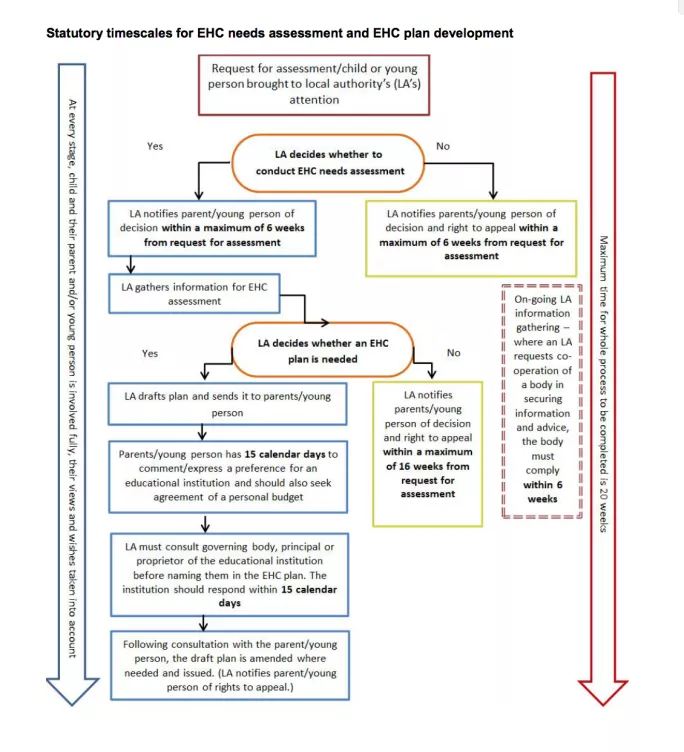
- Home
- Everything you need to know about EHCPs
Everything you need to know about EHCPs

Education, health and care plans (EHCPs) have been designed to help children with special educational needs and disabilities (SEND), and set out how services will work to meet their needs.
They were introduced in 2014 as part of government reforms aimed at improving outcomes for people with SEND, but they are now at the heart of concerns that the current system is failing some of those who depend on it.
Increase: Figures show numbers of EHC plans are rising
Ofsted: SEND funding cuts makes parents think EHC plans are the golden ticket
Analysis: Are EHC plans a problem or a solution for SEND?
What is an EHCP?
EHCPs were created to bring together education, health and social care to secure the best outcomes for children and young people with SEND.
They are produced by local authorities and have replaced statements of special educational needs.
According to the government’s SEND code of practice, EHCPs should:
- Establish and record the views of parents and the children or young people.
- Describe the child or young person’s special educational needs and any health and social care needs they have.
- Establish desired outcomes across education, health and social care for the child or young person.
- Set out how education, health and care services will work together to meet their needs.
Who receives an EHCP?
Local councils decide whether a child or young person needs an EHCP by carrying out an assessment.
This assessment does not always result in an EHCP being developed. Councils can decide that a school, college or other provider can meet the child or young person’s needs without one.
A parent, young person with SEND over the age of 16 or a representative from a school or other provider can request an EHC assessment.
How long should the process take?
From making a request for an EHC assessment to receiving the completed plan should take no longer than 20 weeks.
A local authority must decide whether or not to proceed with an EHC needs assessment, and inform the child’s parent or the young person within a maximum of six weeks of receiving the request.
And if a local authority decides not to issue a plan after carrying out an assessment, it should tell parents or the young person within 16 weeks.
The government’s SEND code of practice says that if a plan is produced, the child’s parent or the young person should be given 15 days to provide their views on a draft EHCP and ask for a particular school or other institution to be named in it.
An EHCP should also be reviewed annually.

Numbers of EHCPs are increasing
Figures published last year showed that the number of EHCPs being issued is increasing.
There was an 11 per cent rise in the number of pupils getting this statutory guarantee of support for their special educational needs or disabilities in 2019, compared with 2018.
The statistics published by the DfE show there were 354,000 children and young people with an EHCP in January 2019 - an increase of 34,200 (11 per cent) from the combined total of children with EHCPs or statements of SEN in January 2018.
How well is the system working?
Since the reforms were introduced in 2014, there have been increasing concerns about how well it is meeting the needs of children and young people with SEND.
There are concerns about the councils’ ability to deliver EHCPs on time and about the quality of the plans that are being produced.
A Tes investigation into inspections of SEND services found that Ofsted and the Care Quality Commission teams regularly found problems with EHCPs.
More than half of the first 100 areas to be inspected were found to have significant weaknesses. And in all 17 areas that were found to have weaknesses last year, the quality of EHCPs was criticised by Ofsted and the CQC.
Inspectors highlighted consistent weaknesses in the quality of EHCPs, plans being out of date and intended targets and outcomes being too vague or lacking aspiration.
What can people do if they are unhappy with an EHCP decision?
People can appeal to a First-tier (SEND) Tribunal if they are unhappy with decision making in the EHC process. This can include EHCP assessments being turned down, assessments that result in no EHCP being issued, or EHCPs being issued, reviewed or discontinued in a way that parents are not happy with.
Parents can also complain about decisions about an EHCP to the Local Government and Social Care Ombudsman.
Last year, the ombudsman revealed that complaints about the EHC process rose by 45 per cent between 2016-17 and 2018-19. However, the ombudsman cannot look at complaints that relate to schools.
What might change in future?
The government is currently carrying out a review into SEND provision, which was announced by education secretary Gavin Williamson.
There has also been a major report into SEND carried out by the Commons Education Select Committee, which has made a number of recommendations about the EHC process.
The report, produced by MPs last year, called for the Department for Education to create a clear and standard process for assessing the need for and producing EHCPs. It said this would reduce paperwork and simplify the process for all involved.
Register with Tes and you can read five free articles every month, plus you'll have access to our range of award-winning newsletters.
Keep reading for just £4.90 per month
You've reached your limit of free articles this month. Subscribe for £4.90 per month for three months and get:
- Unlimited access to all Tes magazine content
- Exclusive subscriber-only stories
- Award-winning email newsletters
You've reached your limit of free articles this month. Subscribe for £4.90 per month for three months and get:
- Unlimited access to all Tes magazine content
- Exclusive subscriber-only stories
- Award-winning email newsletters



